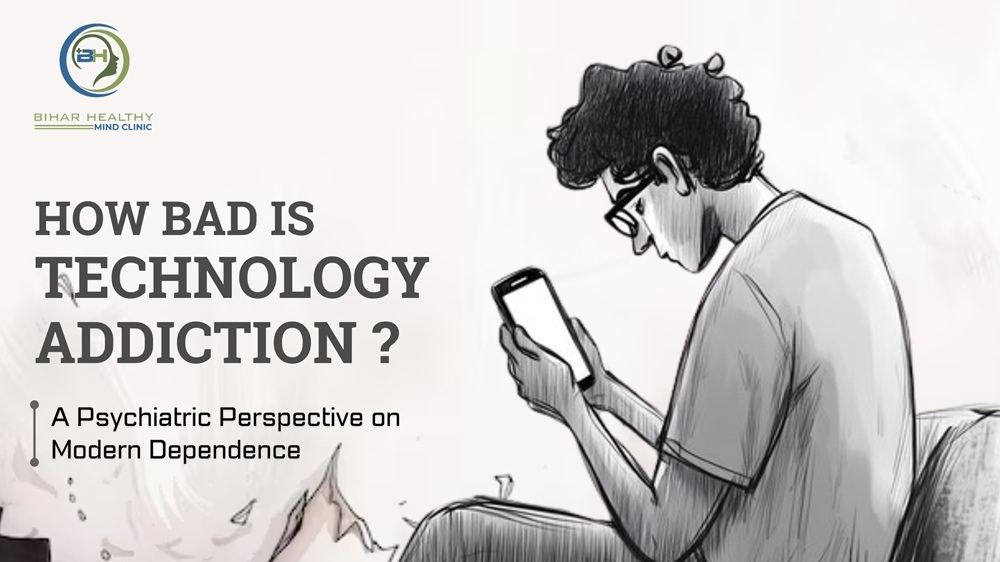
In our digitally-driven age, technology has shifted from being a convenience to becoming an essential part of everyday life. From smartphones and social media to gaming and remote work, we rely on digital tools for nearly every aspect of life. But at what point does dependence on screens turn into a mental health concern?
If you’ve ever found yourself losing track of time while scrolling endlessly, or experienced anxiety when away from your phone, you're not alone. These are signs of technology addiction, a growing concern among psychiatrists and psychologists worldwide.
At Patna Psychiatry, individuals facing challenges with digital overuse receive tailored and research-backed treatment under the skilled supervision of Dr. Saurabh Kumar, MD, acknowledged as the Best Psychiatrist in Patna.
Let’s dive into the reality of technology addiction, its symptoms, causes, mental health implications, and how you or your loved one can find relief.
What is Technology Addiction?
Technology addiction refers to excessive or compulsive use of digital devices such as smartphones, computers, gaming consoles, and the internet that interferes with daily life. Unlike physical addictions, it doesn’t involve substance use but shows similar psychological effects, including withdrawal, dependency, and impaired functioning.
People often ask in technology addiction group discussions, “Is it really that serious?” The answer, from a psychiatric perspective, is a resounding yes. Technology addiction can cause significant emotional, cognitive, and social disruption.
-
Key Symptoms of Technology Addiction
- Preoccupation with digital devices
- Loss of interest in offline activities
- Anxiety or irritability when not using technology
- Neglect of responsibilities and relationships
- Lack of control over screen time
- Sleep disturbances due to late-night usage
These symptoms may mimic those found in behavioral disorders, making early detection and professional evaluation essential.
What Causes Technology Addiction?
The root of the issue isn’t singular, it's shaped by a combination of mental, environmental, and brain-based influences:
- Dopamine reward cycle: Social media likes and gaming victories trigger pleasure centers in the brain, similar to substance abuse.
- Emotional escape: Many use technology to avoid loneliness, stress, or trauma.
- Lack of boundaries: Without limits, digital engagement becomes automatic and uncontrollable.
- Social pressure: Fear of missing out (FOMO) and digital validation create compulsive behaviors.
Impact on Mental Health
From a psychiatrist's viewpoint, the consequences of technology addiction are as profound as any other behavioral disorder:
-
Increased Anxiety & Depression
Regular notifications and social comparisons online can contribute to increased anxiety and lower self-worth.
-
Social Withdrawal
Digital overuse leads to real-life disconnection, affecting communication and emotional bonding.
-
Cognitive Decline
Reduced attention span, impaired memory, and poor decision-making are commonly reported.
-
Sleep Disorders
Prolonged screen exposure during nighttime and consistent blue light intake can disturb the body’s regular sleep-wake pattern.
-
Academic & Professional Decline
Decreased productivity and reduced focus directly impact performance.
These are not isolated findings, they're consistent across technology addiction group discussion forums and mental health consultations.
How Patna Psychiatry Can Help
Treating technology addiction is not about eliminating digital use but restoring balance.
-
At Patna Psychiatry, treatment includes:
- Psychiatric Evaluation: Comprehensive assessments help identify underlying mental health issues such as anxiety, depression, or ADHD.
- Behavioral Therapy: Cognitive Behavioral Therapy (CBT) is used to modify thought patterns that fuel compulsive usage.
- Digital Detox Planning: Structured routines are developed to reduce screen time gradually.
- Family Counseling: Educating families to create a healthy environment that supports recovery.
- Mindfulness Techniques: Tools like meditation, journaling, and breathing exercises improve focus and self-control.
Prevention & Self-Care Tips
Even if you don’t currently suffer from addiction, the line can blur quickly.
-
Here are some psychiatrist-approved tips to maintain a healthy digital relationship:
- Set daily screen time limits.
- Use app blockers to reduce distractions.
- Prioritize in-person interactions.
- Establish device-free zones at home.
- Practice mindful browsing, be aware of how and why you use your devices.
When to Seek Help?
If technology use is interfering with your relationships, work, studies, or emotional well-being, it’s time to reach out.
At Patna Psychiatry, Dr. Saurabh Kumar, known as the Best Psychiatrist in Patna, offers evidence-based treatment that addresses the root of the problem. Compassionate care, expert insights, and holistic strategies ensure that patients don’t just reduce screen time, they reclaim their lives.
Final Thoughts
So, how bad is technology addiction? It’s more than just a bad habit, it’s a mental health condition that deserves serious attention. The good news is, with timely intervention, recovery is entirely possible.
Don’t let screens take over your story. Let Patna Psychiatry guide you back to balance.
Disclaimer: All characters and events depicted in this blog are entirely fictional. Any resemblance to actual persons, living or dead, is purely coincidental. The content is intended for informational purposes only and should not be considered as medical advice. Always consult a qualified healthcare professional for medical concerns.
Visitors: 109





No comments yet.